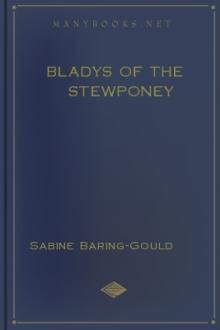The Broom-Squire, Sabine Baring-Gould [books to read this summer txt] 📗

- Author: Sabine Baring-Gould
Book online «The Broom-Squire, Sabine Baring-Gould [books to read this summer txt] 📗». Author Sabine Baring-Gould
She turned in the porch and left the inn, that had once been her home, and the only home in which she had found happiness.
She made her way to the fields that belonged to Simon Verstage, and after wandering through a ploughed glebe she found him.
"Ah, Matabel!" said he, "glad to see you. What brings you here so early in the day?"
"Dear father, I cannot tell you all, but I have left Bideabout. I can stay with him no longer, something has happened. Do not press me to tell--at least not now. I can never return to the Punch-Bowl. Will you take me in?"
The old man mused.
"I'll consult Polly. I don't know what she'll say to it. I'm rather dependent on her now. You see, I know nothing of the house, I always put that into Susanna's charge, and now poor Sanna is gone, Polly has taken the management. Of course, she makes mistakes, but wun'erfully few. In fact, it is wun'erful how she fits into Sanna's place, and manages the house and all--just as if she had been brought up to it. I'll go and ask her. I couldn't say yes without, much as I might wish."
Mehetabel shook her head.
The old man was become feeble and dependent. He had no longer a will of his own:
"I will not trouble you, dear father, to ask Polly. I am quite sure what her answer will be. I must go further. Who is Guardian?"
"That's Timothy Puttenham, the wheelwright."
Then Mehetabel turned back in the direction of the village and came in front of the shop. Puttenham and his apprentice were engaged on the fire, and Mehetabel stood, with the babe folded in her arms, watching them at work. They might not be disturbed at the critical period when the tire was red hot and had to be fitted to the wheel.
A circle of flame and glowing ashes and red-hot iron was on the ground. At a little distance lay a flat iron disc, called the "platform"; with a pole in the centre through which ran a spindle. On this metal plate lay a new cast wheel, and the wright with a bar screwed a nut so as to hold the cart-wheel down firmly on the "platform."
"Now, boy, the pincers!"
Then he, grasping a long pair of forceps, his apprentice with another, laid hold of the glowing tire, and raising it from the fire carried it scintillating to the wheel, lifted it over the spindle, and dropped it about the woodwork. Then, at once, they seized huge hammers and began to belabor the tire, to drive it on to the wheel, which smoked and flamed.
"Water, boy, water!"
The apprentice threw water from a pitcher over the tire throughout its circumference, dulling its fire, and producing clouds of steam.
Mehetabel, well aware that at this juncture the wright must not be interfered with, drew close to the fire, and kneeling by it warmed herself and the sleeping child, whilst she watched the sturdy men whirling their hammers and beating the tire down into place around the wheel.
At length the wright desisted. He leaned on his great hammer; and then Mehetabel timidly addressed him.
"Please, Mr. Puttenham, are you not Guardian of the Poor?"
"Certainly, Mrs. Kink."
"May I be put in the Poors' House?"
"You!"
The wheelwright opened his eyes very wide.
"Yes, Mr. Puttenham, I have no home."
"Why, Matabel! What is the sense of this? Your home is in the Punch-Bowl."
"I have left it."
"Then you must return to it again."
"I cannot. Take me into the Poors' House."
"My good girl, this is rank nonsense. The Poor House is not for you, or such as you."
"I need its shelter more than most. I have no home."
"Are you gone off your head?"
"No, sir. My mind is sound, but to the Punch-Bowl I cannot, and will not, return. No, never!"
"Matabel," said the wheelwright, "I suppose you and Jonas have had a quarrel. Bless you! Such things happen in married life, over and over again, and you'll come together and love each other all the better for these tiffs. I know it by experience."
"I cannot go back! I will not go back!"
"It is not cannot or will not--it is a case of must. That is your home. But this I will do for you. Go in and ask my old woman to let you have some breakfast, and I'll send Jack"--he signed to his apprentice--"and bid him tell Bideabout where you are, and let him fetch you. We mustn't have a scandal."
"If Jonas comes, I shall run away."
"Whither?"
That Mehetabel could not say.
"Where can you go? Nowhere, save to your husband's house. For God's sake!" he suddenly exclaimed, knocking his hammer on the tire, "don't say you are going to Guildford--to Iver Verstage."
Mehetabel raised her heavy eyes, and looked the wheelwright frankly in the face. "I would rather throw myself and baby into one of the Hammer Ponds than do that."
"Right! You're a good gal. But there was no knowing. Folks talk. Come in! You shall have something--and rest a while."
The kind, well-intentioned man laid his large hand on her shoulder and almost forced her, but gently, towards the house. She would not enter the door till he had promised not to send for Jonas.
Selena Puttenham, the wright's wife, was a loquacious and inquisitive woman, and she allowed Mehetabel no rest. She gave her bread and milk with readiness, and probed her with questions which Mehetabel could not answer without relating the whole horrible truth, and this she was resolved not to do.
The wright was busy, and could not remain in his cottage. The wife, with the kindest intentions, was unable to restrain herself from putting her guest on the rack. The condition of Mehetabel was one to rouse curiosity. Why was she there, with her baby, in the early morning? Without having even covered her head; fasted and jaded? Had there been a quarrel. If so--about what? Had Bideabout beaten her? Had he thrust her out and locked the door? If so, in what had she offended him? Had she been guilty of some grievous misdemeanor?
At length, unable further to endure the torture to which she was subjected, Mehetabel sprang up, and insisted on leaving the cottage.
Without answering Mrs. Puttenham's question as to whither she was going, what were her intentions, the unhappy girl hastened out of the village clasping in her arms the child, which had begun to sob.
And now she made her way towards Witley, of which Thursley was a daughter parish. She would find the Vicar, who had always treated her with consideration, and even affection. The distance was considerable, in her weary condition, but she plodded on in hopes. He was a man of position and authority, and she could trust him to protect her and the child. To him she would tell all, in confidence that he would not betray her secret.
At length, so fagged that she could hardly walk, her arms cramped and aching, her nerves thrilling, because the child was crying, and would not be comforted, she reached the Vicarage, and rang at the back door bell. Some time elapsed before the door was opened; and then the babe was screaming so vociferously, and struggling in her arms with such energy, that she was not able to make herself heard when she asked for the Parson.
The woman who had answered the summons was a stranger, consequently did not know Mehetabel. She made signs to her to go away.
The cries of the child became more violent, and the mother's efforts were directed towards pacifying it. "Let me come in, I pray! I pray!" she asked with a brow, in spite of the cold, bathed in perspiration.
"I cannot! I must not!" answered the woman. She caught her by the arm, drew her aside, and said--"Do you not know? Look! the blinds are all down. He died in the night!"
"Dead!" cried Mehetabel, reeling back. "My God! whither shall I go?"
CHAPTER XXXIX.
AT THE SILK MILL.
Mehetabel sank on the grass by the drive.
"I am worn out. I can go no further," she said, and bowed her head over the child.
"You cannot remain here. It is not seemly--a house of mourning," said the woman.
"He would not mind, were he alive," sobbed Mehetabel. "He would have cared for me and my babe; he was always kind."
"But he is not alive; that makes the difference," said the servant. "You really must still the child or go away."
"I cannot go another step," answered Mehetabel, raising her head and sinking it again, after she had spoken.
"I don't know what to do. This is unreasonable; I'll go call the gardener. If you won't go when asked you must be removed by force."
The woman retired, and presently the gardener came up. He knew Mehetabel--that is to say, knew who she was.
"Come," said he, "my cottage is just yonder. You must not remain here on the green, and in the cold. No wonder the child screams. There is a fire in my house, and you can have what you like for a while, till you are rested. Give me your hand."
Mehetabel allowed him to raise her, and she followed him mechanically from the drive into the cottage, that was warm and pleasant.
"There now, missus," said the man; "make yourself comfortable for an hour or two."
The rest, the warmth, were grateful to Mehetabel. She was almost too weary to thank the man with words, but she looked at him with gratitude, and he felt that her heart was over full for her to speak. He returned to his work, and left her to herself. There was no one else in the cottage, as he was a widower, and had no family.
After a considerable time, when Mehetabel had had time to recruit her strength, he reappeared. The short winter day was already closing in. The cold black vapors rose over the sky, obscuring the little light, as though grudging the earth its brief period of illumination.
"I thought I'd best come, you know," said the man, "just to tell you that I'm sorry, but I can't receive you here for the night. I'm a widower, and folk might talk. Why are you from home?"
"I ran away. I cannot return to the Punch-Bowl."
"Well, now. That's curious!" said the gardener. "Time out of mind I've had it in my head to run away when my old woman was rampageous. I've knowed a man who actually did run to Americay becos his wife laid on him so. But I never, in my experience, heard of a woman runnin' away from her husband, that is to say--alone. You ain't got no one with you, now?"
"Yes, my baby."
"I don't mean that. Well, it is coorious, a woman runnin' away with her baby. I'm terrible sorry, but I can't take you in above another half-hour. Where are you thinking of goyne to?"
"I know of no where and no one."
"Why not try Missus Chivers at Thursley. You was at her school, I suppose?"
"Yes, I was there."
"Try her, and all will come right in the end."
Mehetabel rose; her child was now asleep.
"Look





Comments (0)